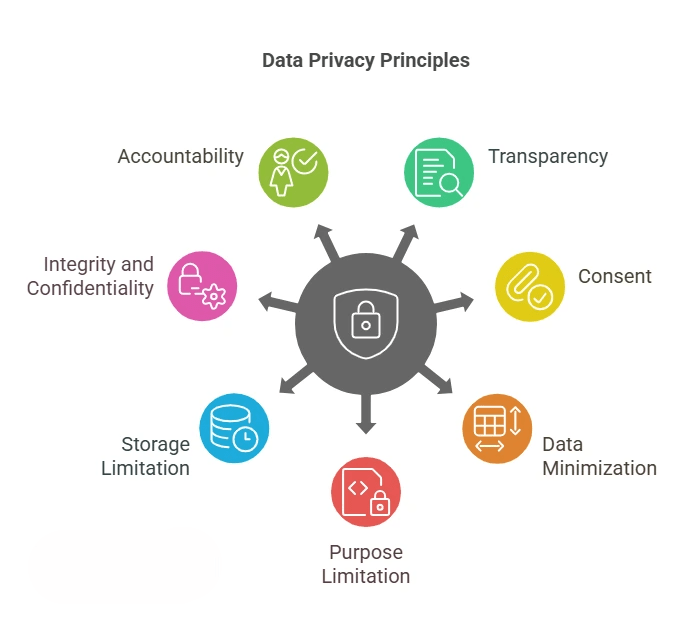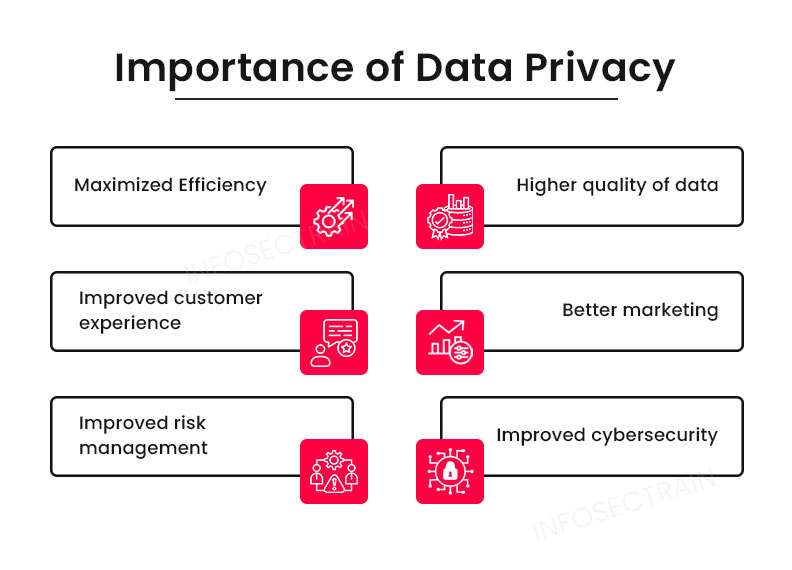
- Definition of Data Privacy
- Why Data Privacy Matters
- Personal Data vs Sensitive Data
- Key Privacy Principles
- Global Data Privacy Laws (e.g., GDPR, CCPA)
- User Consent and Transparency
- Privacy Policies and Notices
- Data Breach Notification Rules
Definition of Data Privacy
Data privacy refers to the proper handling, processing, storage, and usage of personal information to protect it from unauthorized access, misuse, or exposure. It encompasses a set of principles and practices designed to ensure that individuals have control over how their personal data is collected and shared. In an era where data breaches and cyber threats are increasingly common, organizations must adopt comprehensive data privacy solutions to safeguard sensitive information. This includes implementing a robust data protection policy that outlines the guidelines for data access, storage, encryption, and sharing practices, supported by regular Cyber Security Training to ensure employees understand and follow best practices for protecting personal data. The core objective is to maintain the confidentiality and integrity of data while complying with relevant legal frameworks like GDPR, HIPAA, or CCPA. Personal information protection is not only a legal requirement but also a critical trust-building factor between businesses and their users. When data privacy is breached, it can lead to significant reputational damage and legal consequences. Therefore, businesses must prioritize data governance, limit data collection to what is necessary, and ensure transparency in data handling processes. By doing so, they can foster trust, reduce risk, and demonstrate a commitment to responsible data stewardship in today’s digital landscape.
Interested in Obtaining Your Cybercrime Certificate? View The Cyber Security Online Training Offered By ACTE Right Now!
Why Data Privacy Matters
- Protects Personal Information: Ensuring information privacy helps guard sensitive data like names, addresses, financial details, and health records from unauthorized access and identity theft.
- Ensures Legal Compliance: Following privacy compliance standards like GDPR and CCPA compliance helps businesses avoid hefty fines and legal issues while promoting ethical data practices and aligning with a broader Overview of Cybersecurity Threats that highlights the importance of safeguarding personal data against evolving digital risks.
- Builds Customer Trust: Transparent data practices, including the use of tools like OneTrust cookie banners, show users that their privacy choices matter, increasing loyalty and confidence.
In today’s digital world, where vast amounts of personal data are shared and stored online, data privacy has become more critical than ever. From businesses to everyday users, understanding and respecting information privacy helps build trust, prevent misuse, and ensure legal and ethical handling of personal data. Protecting user data isn’t just a best practice it’s a legal obligation under frameworks like CCPA compliance and GDPR. Below are six key reasons why data privacy truly matters:

- Prevents Data Misuse: Strong data privacy measures limit how personal data is collected and used, reducing risks of exploitation and invasive targeting.
- Supports Ethical Digital Practices: Respecting cookies privacy and user consent helps promote fairness and accountability in digital marketing and analytics.
- Reduces Security Risks: Prioritizing data privacy reduces the likelihood of breaches and cyberattacks, ensuring long-term business resilience and user safety.
Personal Data vs Sensitive Data
Personal data and sensitive data are both critical categories of information that require careful handling under privacy laws, but they differ in terms of their nature and the level of protection they demand. Personal data refers to any information that can identify an individual directly or indirectly, such as name, email address, phone number, or IP address. Understanding and protecting this data is essential, especially when Exploring Digital Signature in Cryptography, which ensures data integrity and authentication in digital communications. In contrast, sensitive data includes details that are more private and could cause greater harm or discrimination if exposed, such as health records, biometric data, religious beliefs, sexual orientation, or political opinions. Because of its higher risk, sensitive data is subject to stricter rules and consent requirements under most data protection policies. Organizations must implement robust data privacy solutions that classify and manage both types of data appropriately to ensure compliance and safeguard individual rights. Effective personal information protection strategies involve encryption, access controls, and continuous monitoring, especially when handling sensitive data. Understanding the distinction between personal and sensitive data helps businesses apply the correct level of security and transparency, reduce compliance risks, and build trust with users. As data regulations evolve, having a clear framework for handling both categories is essential for maintaining ethical and secure data practices.
To Explore Cybersecurity in Depth, Check Out Our Comprehensive Cyber Security Online Training To Gain Insights From Our Experts!
Key Privacy Principles
- Transparency: Clearly inform users about what data is being collected and how it will be used, often through notices like the OneTrust cookie banner.
- Consent and Choice: Give individuals control over their personal data by allowing them to accept or decline data collection, especially regarding cookies privacy and tracking technologies, while reinforcing these practices through regular Cyber Security Training to ensure teams handle data responsibly and compliantly.
- Purpose Limitation: Collect personal data only for specific, legitimate purposes and avoid using it for unrelated activities without further consent.
In the digital age, safeguarding personal data is not just a regulatory requirement but a responsibility that every organization must uphold. Information privacy is guided by a set of core principles that ensure user data is collected, stored, and processed ethically and transparently. These principles form the foundation of global privacy laws such as GDPR and CCPA compliance, and help businesses maintain privacy compliance while fostering trust with users. Below are six key privacy principles every organization should follow:

- Data Minimization: Gather only the minimum amount of data necessary to perform a function, supporting better security and privacy compliance.
- Security Safeguards: Protect personal data with appropriate security measures to prevent unauthorized access, maintaining strong information privacy practices.
- Accountability: Organizations must take responsibility for handling data ethically and ensure ongoing CCPA compliance through audits and policy enforcement.
- Clear Consent Notices: Use simple, jargon-free language to inform users about data collection tools like OneTrust cookie banners help communicate this effectively.
- Granular Consent Options: Allow users to choose what types of data they’re comfortable sharing, such as marketing preferences or third-party tracking, improving cookies privacy and aligning with practices outlined in the Guide to Spear Phishing, which emphasizes the importance of limiting unnecessary data exposure to prevent targeted attacks.
- Easy Opt-Out Mechanisms: Users should be able to withdraw consent at any time through accessible settings, an important requirement for CCPA compliance.
- Real-Time Consent Management: Update user preferences dynamically to ensure ongoing privacy compliance across platforms and campaigns.
- Transparency in Data Use: Clearly explain how and why data is being collected, reinforcing information privacy and ethical practices.
- Regular Policy Updates: Keep privacy policies up to date and notify users of any changes to maintain transparency and build long-term trust.
Global Data Privacy Laws (e.g., GDPR, CCPA)
Global data privacy laws like the General Data Protection Regulation (GDPR) in the EU and the California Consumer Privacy Act (CCPA) in the U.S. have set powerful standards for how organizations handle personal data across regions. These regulations aim to strengthen personal information protection by giving individuals more control over how their data is collected, used, and shared. GDPR emphasizes user consent, data transparency, and the right to access or delete personal data, while CCPA grants California residents rights to know, opt out, and request deletion of their information. These regulations align closely with principles outlined in a Complete Guide to Web Security, highlighting the importance of safeguarding user data and ensuring secure online practices. To comply with these regulations, businesses must adopt comprehensive data privacy solutions that include consent management, access control, and data mapping tools. Moreover, having a clear data protection policy is essential for outlining procedures around data collection, storage, and breach response. Non-compliance with these laws can result in significant financial penalties and reputational damage. As data continues to transcend borders, organizations operating globally must be proactive in understanding and aligning with regional privacy laws. Implementing the right mix of technology, policy, and training ensures not just compliance, but also a strong commitment to protecting the rights and privacy of users worldwide.
Looking to Master Cybersecurity? Discover the Cyber Security Expert Masters Program Training Course Available at ACTE Now!
User Consent and Transparency
User consent and transparency are fundamental pillars of modern data privacy practices. They empower individuals to make informed decisions about how their personal data is collected and used. Regulations like GDPR and CCPA compliance emphasize the need for clear communication and voluntary, informed consent. Ensuring transparency in data practices helps build trust and supports overall privacy compliance. Below are six essential aspects of user consent and transparency:
Privacy Policies and Notices
Privacy policies and notices are essential components of any organization’s commitment to protecting user data and ensuring transparency. These documents clearly outline how personal information is collected, used, shared, and stored, serving as a foundation for personal information protection. A well-crafted privacy policy not only helps users understand their rights but also supports legal compliance with global regulations such as GDPR and CCPA. To achieve this, organizations must align their policies with effective data privacy solutions that manage consent, monitor data usage, and secure sensitive information throughout its lifecycle. Privacy notices, often presented during user interactions like sign-ups or website visits, offer real-time transparency and reinforce user trust—an approach also emphasized in the Quick Guide to Cyber Safety, which highlights the importance of clear communication in protecting user data. Together, these tools demonstrate a company’s proactive approach to data ethics and responsible handling. It’s also vital for businesses to implement a clear and enforceable data protection policy that supports the principles outlined in their privacy documentation. This includes detailing how breaches are handled, who has access to data, and how long information is retained. By regularly updating privacy policies and notices to reflect changes in data practices or legal requirements, organizations can ensure compliance and promote a culture of trust, responsibility, and accountability in today’s data-driven world.
Preparing for Cyber Security Job Interviews? Have a Look at Our Blog on Cyber Security Interview Questions and Answers To Ace Your Interview!
Data Breach Notification Rules
Data breach notification rules are critical in upholding information privacy and maintaining user trust in the digital ecosystem. These rules mandate that organizations promptly inform affected individuals and regulatory authorities when personal data is exposed due to unauthorized access, theft, or loss. Under laws such as GDPR and CCPA compliance, the failure to disclose breaches within a specified timeframe can result in heavy penalties and reputational harm. For instance, CCPA compliance requires notifying California residents without unreasonable delay if unencrypted personal information is compromised. Effective privacy compliance demands not only swift notification but also clear communication about what data was affected, how the breach occurred, and what steps are being taken to mitigate the damage. Incorporating regular Cyber Security Training ensures that employees are prepared to recognize potential threats, respond promptly to incidents, and follow proper protocols during a data breach. Tools like OneTrust cookie management can play a role in breach prevention by ensuring user consent and limiting unnecessary data collection, especially related to cookies privacy. Timely and transparent breach notifications demonstrate a company’s commitment to data responsibility and legal accountability. By embedding strong data breach response plans within broader privacy strategies, businesses can not only comply with legal mandates but also reinforce their dedication to safeguarding personal information and maintaining long-term consumer confidence.




